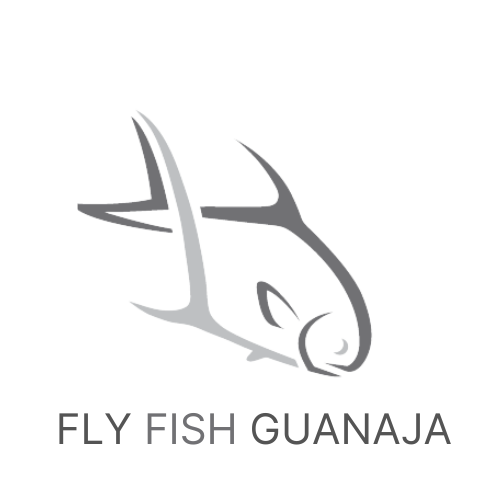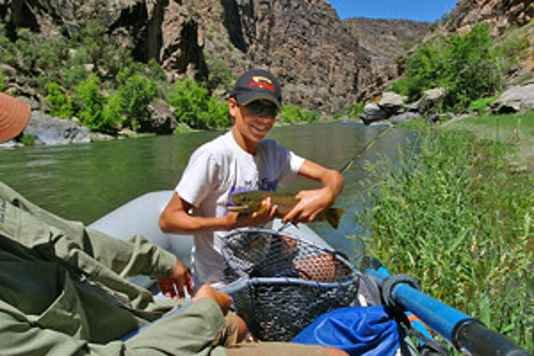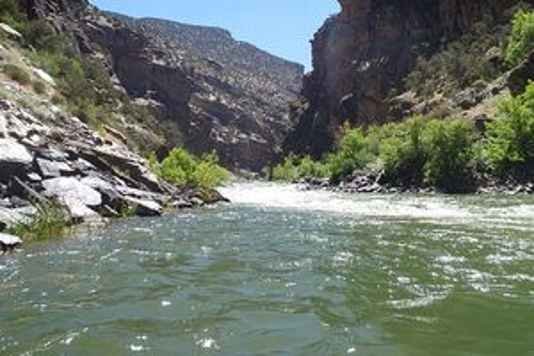One Wild Fishing Expedition
Brownie is pretty handy with those torches
ESPN ARTICLE BY PAT FORDE
He'd learned this bit of entertainment as an apprentice to a juggler in a traveling Honduran circus -- just one more vivid life layer to a 30-something Spicoli-Hemingway hybrid who cannot rinse the wilderness from his soul.
BLACK CANYON, Colo. -- On the last night of the best fishing trip of our lives, Brownie juggled fire. He flung three torches skyward, end over end. Beneath his bare feet, sand. Above his tousled head, steep granite canyon walls giving way to thin black air. To his right, our collection of six captivated anglers and three of Brownie's fellow river guides. To his left, the Gunnison River churned vigorously past, its treasure trove of trout safe from us until dawn.
Brownie had promised a special nightcap, and the flame-throwing was it. He'd learned this bit of entertainment as an apprentice to a juggler in a traveling Honduran circus -- just one more vivid life layer to a 30-something Spicoli-Hemingway hybrid who cannot rinse the wilderness from his soul. Steve "Brownie" Brown grew up in Denver, has a wife back home in Telluride, owns a degree in English and has taught classes at Colorado College. He was a high school wrestler and a college diver. He has started writing a book. But all he really wants to do is sleep under the stars and live on the water.
"The river calls you," Brownie said earlier that night.
The river did call us, at precisely the right time. We answered.
For roughly 60 hours, Brownie was our Lord of the Flies, without the feral devolution into law-of-the-jungle savagery. He led us out of town, out of cell range, out of our comfort zone. He took us on a nausea-inducing van ride to a steep hike to a 15-mile stretch of swift-running river that would humble us, then thrill us. He coaxed us through an outbreak of poison ivy, a bout with a cactus and some early fly-casting ineptitude until we attained angling nirvana.
For a couple of days every year, the Gunny rivals the world's finest fishing locales. And as luck and the flies would have it, we nailed it. We were on the river when the river was going wild.
The true star of this story is about two inches long, weighs less than an ounce and is only slightly smarter than dirt. He is the Pteronarcys californica, better known as the salmonfly.
And he is the stuff of fishing legend.
Every summer, the salmonflies hatch: They crawl out of the water in adult form, mate, and then fall back to the chilly surface in staggering numbers. Waiting to inhale them are big trout driven crazy by this sudden abundance of comparatively huge insects.
It's a food-chain-reaction orgy: Flies hatch, trout go into feeding frenzy, fishermen go berserk as well.
Problem is, the flies don't hatch by calendar or alarm clock or any handy man-made measuring device. Weather plays the key role, and the weather is famously fickle on the Western Slope of Colorado (might snow in June, might be 90 degrees). So anglers have to take an educated guess, and reserve their trips up to a year in advance for the prime summer dates, hoping they've timed it out just right.
My buddy Jeff Runnfeldt, a close friend since junior high, locked in our dates: June 22-24. (Former U.S. president Jimmy Carter would be in the following week for the same trip with the same guides -- just missed the hatch, Mr. President.) I made the trip, from my home in Kentucky to the state where I grew up, with my sons: Mitchell, 14, and Clayton, 12. We are avid, intermediate-level bass fishermen, but fly-fishing rookies. Joining us were two of Jeff's friends, Ben Cahill of Chicago and Dave Sadoff of nearby Telluride.
As it turned out, the dates were perfect; the fishing gods kissed us on the lips. The night Brownie was entertaining us with fire, we had the cramped forearms and blistered hands to prove it after an epic afternoon of fighting long, muscular browns and rainbows.
Jeff and I caught and released about 30 trout in our raft that day alone, several longer than 20 inches. They hammered "Chernobyl" flies, a big bug with Day-Glo orange and yellow colors that we slapped on the surface along every rock wall and in every eddy we could find. And there were about a dozen near-misses, included one line-snapping monster I lost that our guide that day, Jason, believed was "Herman," a legendarily large rainbow who hangs out along the cliff where I hooked him.
The others had similar success, and similar sweet-Jesus-that-was-unbelievable stories to tell around the camp. Seemingly every cast was producing action somewhere.
And for someone who had always thought the rhapsodizing about fly-fishing was so much grandiloquent puffery, I understood it now. I still don't believe it is either art or religion, but I'll buy some of Brownie's big-picture dreaminess on the subject.
"The river is an arena for infinite challenge and reward," he said. "The trout are secrets revealed -- nature's best artwork. The river is timeless, one of the few places we can live in the moment."
I know this much: When the moment involves hitting a big fish on light tackle amid incredible scenery, it's just about the height of sporting enjoyment.
Here's the funny thing about it: Fishing is considered a slow-paced, often static pursuit. A relaxing, borderline-lazy hobby. You're allegedly whiling away time in lassitude, composing sonnets in your head or communing with nature, passively waiting for something to happen.
That's untrue of any serious angling, and it's laughably untrue of fly-fishing during the hatch. It is constant motion and action, spiked with blood lust.
Cast the fly with a whip-lashing motion, decidedly different from spin-casting. Re-cast, "mending" the line to adjust for the current. Cast again, with precision, because inches can make the difference between catching big fish and catching nothing. Anticipate the startling, sudden surface strike. Bam! Set the hook! Clamp down on the line! Wait, don't break the line! Let him run! Give him slack! But don't let him swim off into the current! Now reel up the slack! Not too fast! Somebody get the net!
And this much is absolutely true: The more you catch fish, the more you want to catch fish. So you really cannot wait to cast again and again, anticipating the next full-body thrill.
I suppose fly-fishing during the hatch is the Norman Maclean version of a crystal-meth addiction. A river of adrenaline runs through it.
Of course, what ended triumphantly began ingloriously. The Fordes were an early train wreck on this trip.
The alarm clock sang at 4:30 a.m. on the first day, which began at Jeff's Telluride vacation home. From there we drove more than an hour to Montrose and met up with our guides.
Jeff had been on the river several times with Brownie. The rest of us were wading into the unknown.
It was not easy-access fishing. You don't just wake up one morning and decide to fish this particularly rich stretch of the Black Canyon. Just reaching the river is an arduous process; the previously mentioned one-hour van ride along a deeply rutted road was so jarring that it felt as though my internal organs had shifted sides of my body.
From there, it was time to hike 30 minutes downhill to the river. The difficulty of that hike was a bit overrated, but my 12-year-old, Clayton, was sufficiently sickened from the van ride that when we reached the river for our remedial fly-casting lesson, he had to excuse himself and sit down to keep from puking.
Great start, I thought.
It got worse. At lunch, 14-year-old Mitchell blew his nose and reflexively ripped some leaves off the nearest bush to wipe his nose. Thinking back to our pre-launch safety lecture, I immediately groaned.
"That might be poison ivy!" I yelled.
"I don't think so," he replied.
It was. That single brain cramp ultimately would require two doctor's visits and multiple prescriptions, but we didn't know that at the time. The brutal effects of the poison ivy -- it spread from his face to his arms, torso and legs -- wouldn't begin to manifest themselves for 24 hours after the initial wipe.
Still, the boys rallied. Clayton wound up catching four fish the first day. Angling-obsessed Mitchell hauled in nine -- some of them hogs.
I caught one. Of the six fishermen, I was the worst. By a wide margin.
My casting flaws exasperated Jason, our extremely patient guide. He kept telling me the same thing -- "more energy on the back cast" -- and I kept screwing up. Jason continually used his powerful upper body to position the raft against the current in perfect casting areas -- but my line would be hopelessly tangled and I'd miss the opportunity.
At the end of the first day, Jason dropped me off across the river from our camp to fish from the bank while they cooked dinner. I got a nice brown to strike, the kind of save-the-day moment I needed.
After two jumps, it spit the barbless hook and was gone.
That amplified my frustrations and confirmed my fears. I was Charlie Brown, and the rest of this trip was going to suck. I'd never land another trout.
Fortunately, the guides cooked such a delicious steak dinner that it was impossible to stay morose for long. Brownie, Jason, Mark and Jeff worked relentlessly but jovially -- clearly they love what they do, and not because they're getting rich off it.
For several weeks in the winter, Brownie guides fishing expeditions in Honduras, a place he discovered while fishing his way through Central America. The rest of the time, he is working the Gunny.
Brownie is a true American original. He devised the class he taught at Colorado College, "Reading and Writing the River through Fly-fishing, Boating and Backpacking." As part of the curriculum he took students on a four-day fishing trip to the Gunnison and a five-day backpacking trip up the White River every semester.
"We read river stories through many cultures and times," Brownie said. "From ancient Japanese Zen meditations to contemporary fly-fishing literature, we read everything in between. The ultimate writing exercise is listening to the river and transcribing its language into words. My goal was to eventually turn the course over to the river, the ultimate teacher."
Brownie's crew knew this particular river intimately. They expertly rowed the rafts, cooked all the meals, set up and took down camp -- part of which is carefully choosing the location of The Groover.
The Black Canyon is a national park, and under federal law what goes in must come out. That means everything, including No. 2. That's where The Groover comes in.
It's a portable toilet of scant comfort. The guides generally deposit The Groover out of sight and, most importantly, downwind from camp. (They savvily chose a location the second night that was behind a juniper tree but still offered a lovely river view for anyone inclined to sit a spell.)
The guides also had to administer first aid that first night. At dusk, Mitchell tripped while walking back to camp from some bank fishing and landed heavily in a cactus. His right palm and the back of his right leg were covered in needles.
It took long and tedious tweezing by flashlight to remove all the needles. One thick, splinterish spine was buried deep in his palm, and Brownie had to cauterize a fishing hook and methodically dig into the skin to extract the splinter.
That wasn't fun. Mitchell sucked it up and endured it as stoically as possible, a small coming-of-age moment for a teenager on a grown-up trip. I was quietly proud of him.
We went to our sleeping bags shortly thereafter with seemingly every star in the universe shining above us. At altitude, under a clear sky and far from the pollution of the front range of the Rockies, you could literally see for light-years.
While we slept, I'm pretty sure the river spoke to us. It said the next day would be amazing.
It started modestly. I broke the Charlie Brown Curse and caught a brown while bank-fishing shortly after breakfast, but the morning fishing was only sporadic -- a few caught here and there.
It was after lunch that the Gunny blew up.
With the timing just right, Pat and his crew started reeling some big ones in.
Jason heroically rowed us into one honey hole after another, showing us where to cast for optimum results.
"See those splash marks on the wall?" he'd say, indicating where a big fish had risen and displaced water while attacking a floating salmon fly. "Cast there."
Every cast seemed to produce either a fish or a strike. Jeff was particularly on fire, hitting big trout all over the place. He somehow kept one on the hook even as we rushed through a Class 4 rapid called Boulder Garden. He and Jason combined to net another fish at the James-Bond-nick-of-time, allowing Jason just a second to grab the oars and steer us around a potential capsizing collision with a huge rock in the river.
This was like the ESPN Saturday morning fishing shows, without the edits for time elapsed catching nothing. It seemed we couldn't miss.
My casting had improved appreciably from the first day, but the honest truth was that it didn't take Brad Pitt casts of lyrical beauty to produce vicious strikes. It was more the fish -- and the flies -- than the fishermen.
And after hauling in a dozen beautiful trout in an orgiastic afternoon, I was fine with that. Absolutely fine with it. No need apologizing for perfect timing.
Day 3 was a slight anticlimax. For starters, the river was up appreciably, apparently after more water was released from Blue Mesa Reservoir. (Brownie found out the hard way, waking up wet in the middle of the night to find out his sleeping bag was partly in the river.) That changed the game a bit, and seemed to curtail the trout bingeing.
Still, fishing with Mitchell, we each caught a handful of nice browns while floating out of the canyon and into more wide-open spaces. By the time we came to the end of our trip, it was mid-afternoon on a sizzling day and we were cooked. As much fun as we had, we were dirty and tired and ready to get off the river.
Jason heroically rowed us into one honey hole after another, showing us where to cast for optimum results.
"See those splash marks on the wall?" he'd say, indicating where a big fish had risen and displaced water while attacking a floating salmon fly. "Cast there."
Every cast seemed to produce either a fish or a strike. Jeff was particularly on fire, hitting big trout all over the place. He somehow kept one on the hook even as we rushed through a Class 4 rapid called Boulder Garden. He and Jason combined to net another fish at the James-Bond-nick-of-time, allowing Jason just a second to grab the oars and steer us around a potential capsizing collision with a huge rock in the river.
This was like the ESPN Saturday morning fishing shows, without the edits for time elapsed catching nothing. It seemed we couldn't miss.
My casting had improved appreciably from the first day, but the honest truth was that it didn't take Brad Pitt casts of lyrical beauty to produce vicious strikes. It was more the fish -- and the flies -- than the fishermen.
And after hauling in a dozen beautiful trout in an orgiastic afternoon, I was fine with that. Absolutely fine with it. No need apologizing for perfect timing.
Day 3 was a slight anticlimax. For starters, the river was up appreciably, apparently after more water was released from Blue Mesa Reservoir. (Brownie found out the hard way, waking up wet in the middle of the night to find out his sleeping bag was partly in the river.) That changed the game a bit, and seemed to curtail the trout bingeing.
Still, fishing with Mitchell, we each caught a handful of nice browns while floating out of the canyon and into more wide-open spaces. By the time we came to the end of our trip, it was mid-afternoon on a sizzling day and we were cooked. As much fun as we had, we were dirty and tired and ready to get off the river.
Leon Jagodinski: a transplanted Midwesterner, proud Green Bay Packers fan and certifiable character. Leon will tell you all about his power-boat excursions up the river, about the five bottles of whiskey he has stashed in a crevice on one of the cliff walls, about all the Secret Service hassling he's gotten in advance of the Carter trip. He'll show you an obviously ancient picture of a man cradling a behemoth rainbow and tell you it was taken last year. He'll talk like he's sold more flies in a week than Orvis will sell in a year.
After spending three days in a bobbing raft on rapidly flowing water, the stool seemed to be moving beneath me as Leon rambled. It couldn't be classified as motion sickness, because it actually felt good.
I think I was feeling Brownie's teachings in action. The river was speaking to me. Its voice might never go away.
Pat Forde is a senior writer for ESPN.com.








